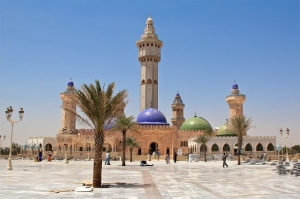Ahmadou Bamba was born in the year 1853 in the village of Mbacké. His family descended from a long line of Qa’dirī scholars. His parents were Mame Momar Anta Saly and Mariyama Bousso. His father was the most well respected qa’di in his kingdom, responsible for building several Islamic schools and his mother was known for her service to the community as well. As a child, he was eager to study the various Islamic sciences and imitate his father in his devotional acts.
Shaykh Ahmadou founded the Mouridiyya brotherhood in 1883, with its capital in Touba, Senegal. His teachings emphasised the virtues of hard work, self-reliance, good manners and adherence to the Qur’an and Sunnah. The Mouridiyya united its followers under a common banner of faith with an emphasis on love for Allah and the Prophet ﷺ. As the Mouridiyya grew in numbers, it emerged as a resistance to French imperialism and would soon become the most effective weapon in battling the devastating social effects of imperialism. They were no longer just a religious revivalist movement, but a social revolution.
In 1887, Shaykh Bamba founded Touba, Arabic for Felicity and the name of a tree in Paradise. With the principles he established, Touba soon become a flourishing spiritual hub and it was from here that the Shaykh’s teachings would spread to the rest of Senegal and beyond.
As Bamba’s influence spread, the French colonial government worried about his growing power and considered Bamba a threat to their rule over Senegal; they feared a rebellion. In 1895, the French took Shaykh Amadou to trial on account of raising an army against the state. Before the Conseil d’Etat of Saint-Louis, he made his desire for a Muslim Senegal clear while also embodying a new form of nonviolent resistance against the aims of colonial evangelists. As a result, the Privy Council decided to deport him to ‘a place where its fanatic preachings would not have any effect’ and exiled him to Gabon where he stayed for 7 years and 9 months. His exile, however, only fuelled legends of miraculous survival stories of escaping torture, deprivation, and attempted executions at the hands of the French. He returned in 1902 only to be exiled to the deserts of Mauritania where he spent 4 years amongst scholars and ascetics. During his exiles, he spent his time writing poems in praise of Allah and the Messenger ﷺ and writing books on fiqh, aqida and tafsir.
The French, realising their attempts had backfired, brought the Shaykh back to Senegal in 1907 where his influence and followers had only increased. Still considering him a threat, the French kept him under house arrest for the remainder of his life. In 1919, he was rewarded with the French Legion of Honour but he refused to wear the medal on account of materialism.
He passed away in 1927 and was buried in Touba which is now Senegal’s second biggest city. Today, more than half of the Senegalese population follow the Mouridiyya order and such communities exist all around the world today. Every year, Touba attracts millions during the Grand Magal, a commemoration of Shaykh Ahmadou’s departure into exile. Lectures are given and group recitations of Qur’an and poetry are performed.
In a poem dedicated to Touba, Shaykh Ahmadou wrote:
“My Lord has blessed me with a place that rid me with all obstacles the minute I entered it.”


